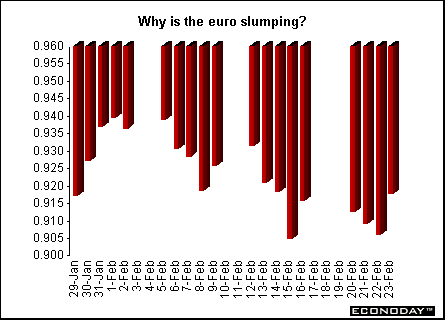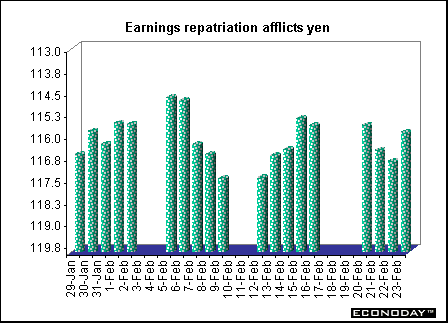
Currencies
The euro fell to a two month low against the dollar after Turkey abandoned its defense of the lira, raising speculation European lenders will suffer losses on loans to Turkish banks. German banks are the biggest lenders to Turkey (according to the Bank for International Settlements) and are the foreign banks with the most exposure to Turkey. The euro's slide is also based in part on pure contagion fears, as proximity does matter in foreign exchange when it comes to crisis situations.

The euro continues to fall against the dollar amid expectations that further signs of a weakening U.S. economy will be needed to drive the European currency higher. It continues to fall even after reports suggested faster than expected growth in Germany and France. The euro continues to trade on U.S. news, not European data. Expectations for faster growth may bolster the euro by attracting investors to EMU financial assets. Many analysts are forecasting U.S. growth below 2 percent this year, while euro region expansion is expected to hold above 2.5 percent.
The yen hovered near a two week high against the dollar as declines in the Nikkei spurred speculation the nation's companies will accelerate repatriation of profits and proceeds from asset sales. When stocks fall, Japanese firms need to liquidate their foreign currency denominated bonds to cover losses at home, which pushes up the yen. The Nikkei 225 stock average has slumped 35 percent so far this fiscal year and yields on fixed income investments in Japan are near two year lows. That, along with the yen's 11 percent slump so far this fiscal year, is prompting companies and others to step up repatriation of overseas proceeds.

Japanese markets responded pretty well to the S&P downgrade. The yen was little changed against the dollar after the credit rating cut. S&P is concerned that the government has to keep borrowing record amounts to prop up the economy. Moody's Investors Service made a similar decision more than two years ago.
The yen may be buoyed in the weeks ahead by Japanese exporters bringing overseas earnings home and the prospect of Japanese Prime Minister Yoshiro Mori being replaced. But analysts expect Japan's economic weakness ultimately to weigh on its currency. Mori's departure would raise hopes of reforms needed to boost the economy, though yen gains may be short lived because there is little a new prime minister could do to bolster growth.


Introduction • Global Stock Market Indexes • Recap of Global Markets • Currencies • Indicator Scoreboard

The Bottom Line • Looking Ahead
|